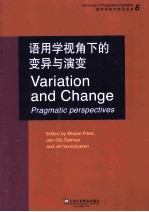

语用学视角下的变异与演变PDF电子书下载
- 电子书积分:11 积分如何计算积分?
- 作 者:Mirjam Fried,Jan-Ola Ostman,Jef Verschueren编
- 出 版 社:上海:上海外语教育出版社
- 出版年份:2014
- ISBN:9787544636780
- 页数:275 页
Introduction:From instances of change to explanations of change&Mirjam Fried 1
1.Approaches to variation and change 2
2.Diachronic analysis and'pathways'of change 5
3.Intra-lingual variation 8
4.Cross-language variation 1o 14
5.Summary and outlook 14
Borrowing&Jeanine Treffers-Daller 17
1.Introduction 17
2.Short historical overview 18
3.Definitions of borrowing: Terminological issues 19
4.Different types/classifications of borrowing 21
5.The integration of borrowings 23
6.Constraints 25
7.Quantitative approaches 29
8.Psycholinguistic approaches 30
Contact linguistics&Michael Meeuwis ? Jan-Ola ?stman 36
1.Introduction 36
2.Contact in relation to classificatory bases in linguistics 36
3.Contact and location 37
4.Direction of interference 38
5.Indirect influence in language contact 42
6.Contact as process:Towards pragmatics 42
Creoles and creolization&Salikoko Mufwene 46
Dialect&Ronald Macaulay 61
1.Introduction 61
2.Other labels 62
2.1 Variety 62
2.2 Lect 63
2.3 Vernacular 63
2.4 Social dialects 64
3.Dialects as local forms of speech 64
4.Some examples of dialect studies 67
5.Some recent developments in the U.S. 68
Dialectology&Georges De Schutter 73
1.Definition 73
2.An outline of history 73
3.Aims of the investigation 75
3.1 The impact of history on the origin and evolution of languages 76
3.2 Linguistic reconstruction 76
3.3 The study of universals of language,especially implicational scales 77
3.4 Sociopragmatic and attitudinal aspects 77
3.5 Communicative aspects 78
4.Dialect atlases 79
Evolutionary pragmatics&Wolfgang Wildgen 81
1.Pragmaticism,pragmatics,adaptation and the evolution of language 81
2.Sign-functions and their evolutionary significance 83
2.1 The triad of sign functions 83
2.2 The evolutionary interpretation of the triad of functions 84
2.3 Selective value of communication and symbolic behavior 86
3.Can the pragmatics of tool production and tool-use tell us something about the origin of language? 87
3.1 Instrumentality in higher mammals and man 88
3.2 Is tool-making a pragmatic source of propositional semantics? 91
3.3 Cro-Magnon life space and the pragmatic space of decorated caves 93
4.From ecological to cultural pragmatics 95
5.Conclusions 96
Historical linguistics&Louis Goossens 100
1.Introduction 100
2.HL in pre-generative work 100
3.HL and generative grammar 103
4.New perspectives 104
5.Explicit 107
Historical pragmatics&Andreas H.Jucker 110
1.Introduction 110
2.Origins 111
3.Data problems 111
4.Topics 113
4.1 Discourse markers 113
4.2 Speech acts 114
4.3 Politeness 116
5.New perspectives 118
Implicature and language change&Kate Kearns 123
1.Introduction 123
2.Analyses citing conversational principles 124
3.Implicature and metaphor 131
4.Implicature,metonymy and merger 134
5.Inferences based on lexical concepts 135
6.Summary 139
Interlanguage pragmatics&Gabriele Kasper 141
1.Definition and scope 141
2.Pragmatic comprehension 141
2.1 Comprehension of nonliteral utterances 141
2.2 Assessment of politeness 142
2.3 Sociopragmatic assessment 142
3.Production of linguistic action 143
4.Development of pragmatic competence 144
4.1 Cross-sectional studies 144
4.2 Longitudinal studies 145
4.3 Theoretical accounts 145
5.Pragmatic transfer 146
5.1 Definition 146
5.2 Positive transfer 146
5.3 Negative transfer 147
5.4 Transferability 148
6.Communicative effect 149
7.Pragmatic norms 150
8.Language teaching 151
9.Research methods 152
10.Further reading 153
Jargon&Luisa Martín Rojo 155
1.Introduction 155
2.Studies of delinquent jargon and the introduction of a 'value-giving measure' 156
3.Interpretations of antilanguages and their functions 160
3.1 Halliday: The concept of antilanguage 160
3.2 Sociolinguistic functions of delinquent jargon 162
4.Varieties of jargon 165
5.Conclusions 168
Language change&Raymond Hickey 171
1.Introduction 171
2.Issues in language change 173
2.1 Internal and external factors 173
2.2 Simplicity and symmetry 174
2.3 Iconicity and indexicality 174
2.4 Markedness and naturalness 175
2.5 Telic changes and epiphenomena 176
2.6 Mergers and distinctions 177
2.7 Possible changes 178
2.8 Unidirectionality of change 178
2.9 Ebb and flow 179
3.Change and levels of language 180
3.1 Phonological change 180
3.2 Morphological change 181
3.3 Syntactic change 182
4.The study of universal grammar 183
4.1 The principles and parameters model 184
5.Semantic change 186
6.Pragmatic change 187
7.Methodologies 188
7.1 Comparative method 189
7.2 Internal reconstruction 190
7.3 Analogy 190
8.Sociolinguistic investigations 190
8.1 Data collection methods 192
8.2 Genre variation and stylistics 192
9.Pathways of change 192
9.1 Long-term change:Grammaticalization 192
9.2 Large-scale changes:The typological perspective 193
10.Contact accounts 194
11.Language areas(Sprachbünde) 197
12.Conclusion 198
Language contact&Yaron Matras 203
1.Introduction 203
2.Societal multilingualism 203
3.The bilingual individual 204
4.Language mixing in conversation 205
5.Contact-induced language change 207
6.Contact,typology and language classification 210
7.Concluding remarks 212
Reconstruction&Derek Nurse 215
Register&Norbert Dittmar 221
1.History of the term'register' 221
2.Systematization of the term 224
3.Perspectives 228
3.1 Functional linguistics à la Ferguson 229
3.2 Intercultural communication 230
3.3 Linguistic pragmatics 230
3.4 Variation linguistics 231
Typology&Bernard Comrie 234
Variational pragmatics&Klaus P.Schneider 239
1.Introduction 239
2.Pragmatic coordinates 240
2.1 The scope of pragmatics 240
2.2 The place in pragmatics 241
2.3 Levels of pragmatic analysis 244
3.Variational coordinates 246
3.1 Variation and identity 246
3.2 Pragmatic variation 249
3.3 What is a pragmatic variable? 250
4.Methodological concerns 252
4.1 Some basic principles 252
4.2 Data 253
5.Development 254
5.1 History 254
5.2 Research trends 256
6.Perspectives 260
Index 268
- 《信息系统安全技术管理策略 信息安全经济学视角》赵柳榕著 2020
- 《大学英语教学的跨文化交际视角研究与创新发展》许丽云,刘枫,尚利明著 2020
- 《改革进程中的刑事诉讼程序与证据问题研究 基于警察的视角》谢波 2019
- 《走出抑郁与焦虑 中西医视角下的心身同治》杨红琳 2019
- 《现代汉语语用否定研究》王志英 2019
- 《文化转向视角下的英汉翻译问题再审视》王燕著 2020
- 《计算机自适应英语语用能力测试系统设计与效度验证 以TEM4词汇与语法题为例》张一鑫著 2019
- 《比较文学变异学》王超著 2019
- 《基于多维视角的英语语言学理论探索与应用》刘曦著 2019
- 《欠发达区乡村聚落空间演变》李小建著 2019
- 《做个充满激情的教师 教师成功之道》(英)Robert L. Fried著 2009
- 《物理化学》(美)弗里德(Fried,V.)著;薛宽宏译 1983
- 《苦涩巧克力》(德)米亚姆·普莱斯勒(Mirjam Pressler)著;李紫蓉译 2005
- 《小说餐桌 陪伴小说爱好者走进厨房》(美)黛娜·弗莱德(Dinah Fried) 2018
- 《生物学 第2版》(美)G.H.弗里德(George H.Fried),(美)G.J.黑德莫诺斯(George J.Hademenos)著;田清涞等译 2002
- 《Polymer Science and Technology》Joel R.Fried 2003
- 《Schaum's outline of theory and problems of biology》george h.fried 1990
- 《FIELD ARITHMETIC》MICHAEL D.FRIED MOSHE JARDEN 2222
- 《METHODS OF NEUROCHEMISTRY VOLUME 4》RAINER FRIED 2222
- 《GASTROINTESTINAL BLEEDING DIAGNOSIS AND MANGAGEMENT》JOHN A.BALINT I.JAMES SARFEH MARTIN B.FRIED 1977
- 《培智学校义务教育实验教科书教师教学用书 生活适应 二年级 上》人民教育出版社,课程教材研究所,特殊教育课程教材研究中心编著 2019
- 《习近平总书记教育重要论述讲义》本书编写组 2020
- 《办好人民满意的教育 全国教育满意度调查报告》(中国)中国教育科学研究院 2019
- 《教育学考研应试宝典》徐影主编 2019
- 《语文教育教学实践探索》陈德收 2018
- 《家庭音乐素养教育》刘畅 2018
- 《学前教育学》王换成主编 2019
- 《近代体育游戏教育史料汇编 第1辑 1》王强主编 2016
- 《全国学前教育专业(新课程标准)“十三五”规划教材 简谱手风琴教程 第2版》(中国)杨克勤,王宝庆 2019
- 《现代教育技术》李志河主编 2019
